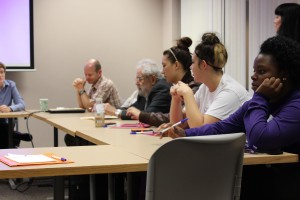The Department of Intercultural Affairs held the Cullowhee Nondenominational Interfaith Conference in the UC, Sept. 21, as its last event of WCU’s Diversity Week.
The turn out was low, but the speakers and attendees made the most out of the people who did show up by turning what would have been an opportunity for guests to attend different sessions led by speakers, into a small and intimate round table discussion on how they embrace or do not embrace religion, forgiveness and the similarities among one another.
The event consisted of seven speakers, all from different backgrounds including WCU professors, campus ministers and a professor from Mars Hill University. Since the event was so small each speaker could only give a brief explanation of the topic that they were going to speak in depth about during their session and afterwards they could take questions from those who wanted to know more about it.

Students, staff and guests have conversation during the Interfaith Conference in the UC Dogwood room.
Students were not excluded, in the beginning ice breakers that expressed hopes and fears for the discussions were done so that guests would feel as though they were in a safe environment to talk about their view points on faith without being judged.
The leaders involved were of Pagan , Catholic, Baptist, Judaism, Muslim and Buddhist faiths, along with those who believed in spirituality or science instead of a specific religion.
Professor Walter Ziffler from Mars Hill University had a particular story to tell, he is a Holocaust survivor who had converted to Christianity from his original faith of Judaism and became a Christian minister for 30 years but ended up returning to his faith later in life to inform and help bridge the gap between Christians and Jews all over the world.
“There is an enormous amount of ignorance out there”. said Professor Ziffler.
WCU’s very own professor of economics Stephen Miller, had a very different view of the world, He believes in Natalism or the ” Pro birth of more humans” it encourages human reproduction and he stressed its important influence on a financial and economical gain, such as the use and growth of land and businesses.
Ultimately, forgiveness and acceptance was the main goal of the event, promoting peace and understanding through religion or the choice of not having one. Conversation can prove as a major tool to change the world if we allow it happen but we must first understand and see each others point of view before that can happen.


